

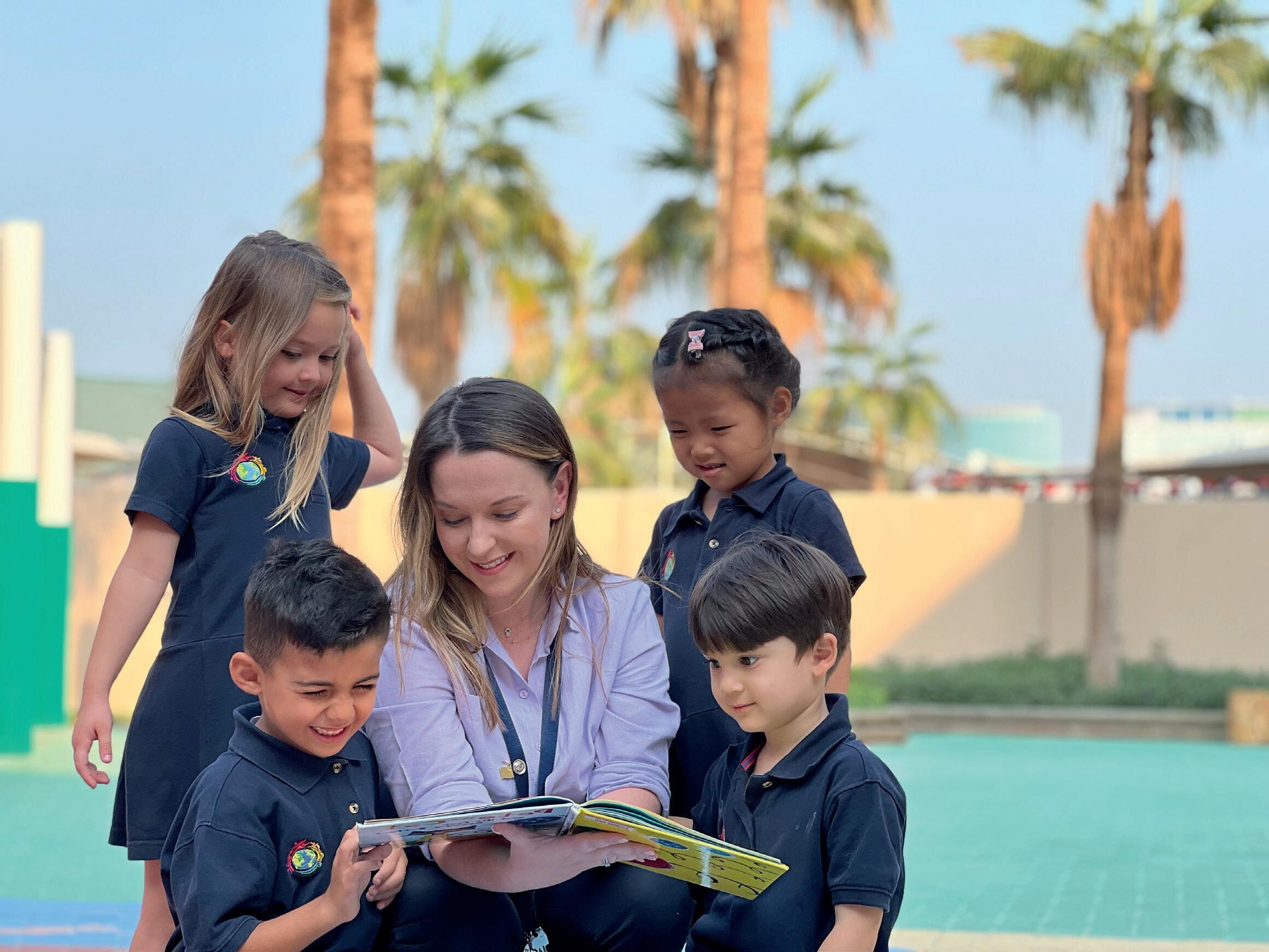
COURSE
2025/26




COURSE
2025/26
At Universal American School, we understand that students in grades six, seven, and eight have different needs from elementary and high school students. For this reason, we have differentiated our Middle School program to best suit the social, emotional, and academic needs of students in these grades.
Over the three years of the Middle School program, UAS teachers help students build a collection of tools and strategies that will support students’ academic and personal development and success. In order to best develop and prepare our students for their futures, we believe a strong partnership between parents and the school are required. Working together can support the development of positive personal and learning habits that provide a strong foundation for high school, college, and beyond. We encourage our families to stay in contact
with their child’s teachers and get involved in our school community through attending meetings and events at UAS.
This Middle School Program Guide provides information supporting a clear, cohesive, and developmentally appropriate learning program specifically designed for our Middle School learners. Please note that this document is intended to be used in conjunction with our Parent/Student Handbooks and other policies published by the school. If at any time you have questions, please do not hesitate to contact us.
We look forward to working with you all in the coming school year.
Kind regards,
The UAS Middle School Leadership Team
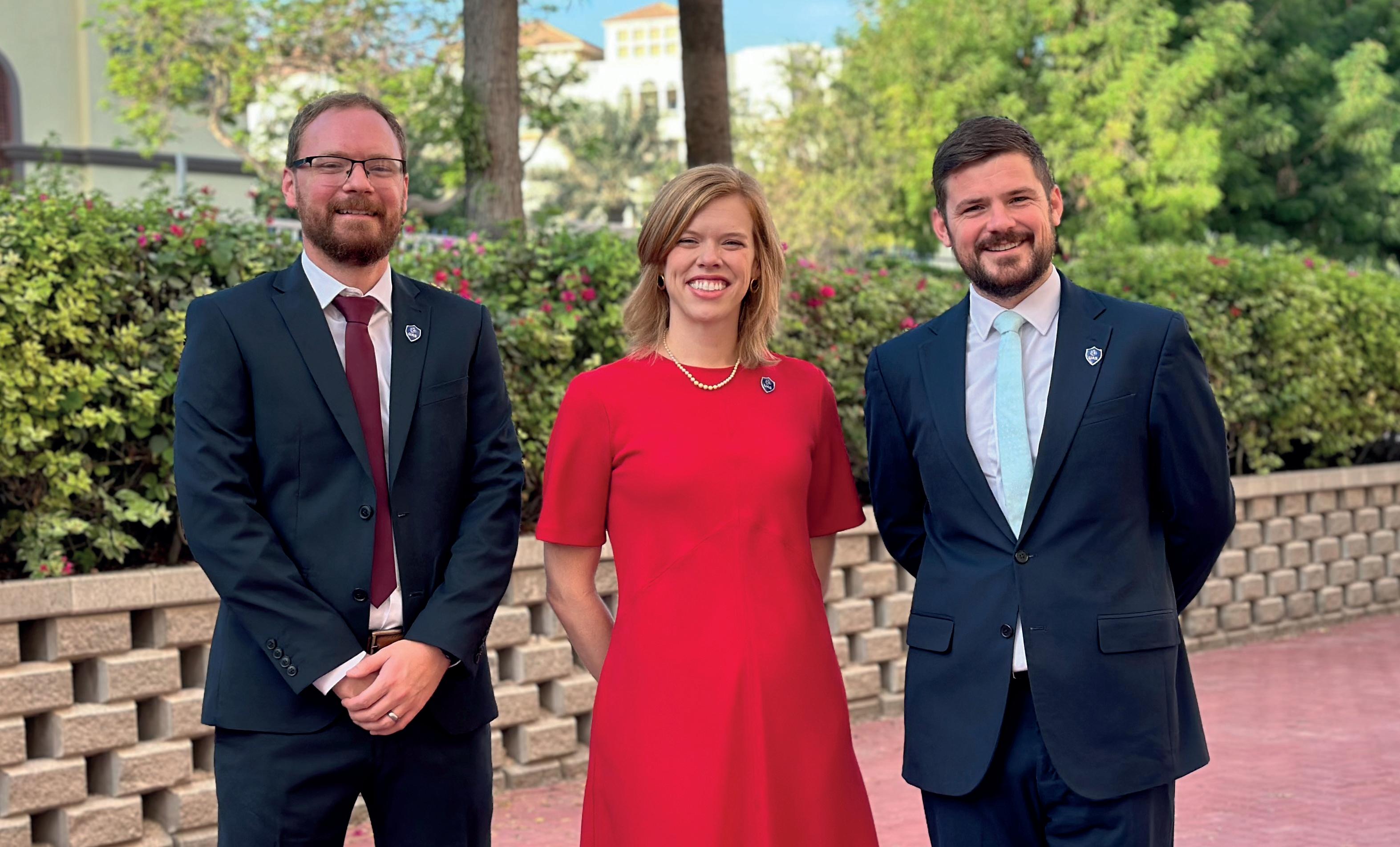

As students enter Middle School, expectations are elevated. Students study more challenging content, have more advanced projects and homework to complete, and are expected to begin to manage their own learning. At UAS we believe that maximizing student success involves setting high expectations and providing the support for students to reach them.
As a member of a learning community that aims to have a culture of excellence, students are expected to follow the policies and procedures set forth by UAS and its teachers. Students should arrive to every class prepared, on time, and in their full uniform. They should also engage fully in the learning activities, respect others and the learning environment, and put forth their best effort on a consistent basis.
We understand that sometimes students may struggle with academic content or social/ emotional conflicts. The UAS staff is here to assist students with issues they may face. We ask that students take the initiative to request support from a teacher or other staff member when they need it. This will help us to ensure that we are
best meeting the needs of each student.
Finally, it is important to mention that it is normal for students to push boundaries at this age. When a student’s behavior is not aligned with the UAS expectations, the student must take responsibility for their actions and accept the consequences. Consequences for behavior that does not meet expectations will be logical, realistic, and consistent, with each case being dealt with on an individual basis according to the UAS Behavior Policy.
It is through high expectations and accountability that we can create a safe, positive learning environment that promotes a culture of excellence.
The first week of the school year will serve as an induction program to the UAS Middle School. During this week students will participate in activities designed to welcome students back to school, build classroom and Middle School community, and develop a clear understanding of the expectations for the school year.
Each student at UAS is a member of one of our four houses: Wolves, Vipers, Wildcats and Falcons. All students are encouraged to actively participate in their house, its activities, and our spirit days at UAS.
The aim of our house system is to promote teamwork, inspire school and house spirit, and develop a sense of belonging. The houses are used to celebrate positive contributions in the classroom such as effort, achievement, and demonstrations of good character. Houses also serve to build camaraderie and celebrate achievement outside of the classroom through participation in special house days, social and sporting events, and competitions.
Each house is led by a member of our staff along with student leaders selected by their peers. Middle School House Captains are nominated and elected by their peers each year in late September or early October. House captains are expected to be positive role models and take on a range of responsibilities such as leading teams, organizing events, and supporting house-related initiatives.
UAS Middle School students have the opportunity to become involved in the school community through participation in the UAS House Captains. House Captain members are expected to be positive role models and take on a range of responsibilities such as organizing events, planning spirit weeks, and providing a student voice within the school community. Elections for Middle School House Captains will take place each year in September.
To encourage a culture of excellence, we aim to recognize students who are living the UAS Mission and displaying the UAS values and learner profile. Recognition will come in many forms including, but not limited to, verbal recognition in class, the awarding of house points, recognition in assemblies, celebrations,
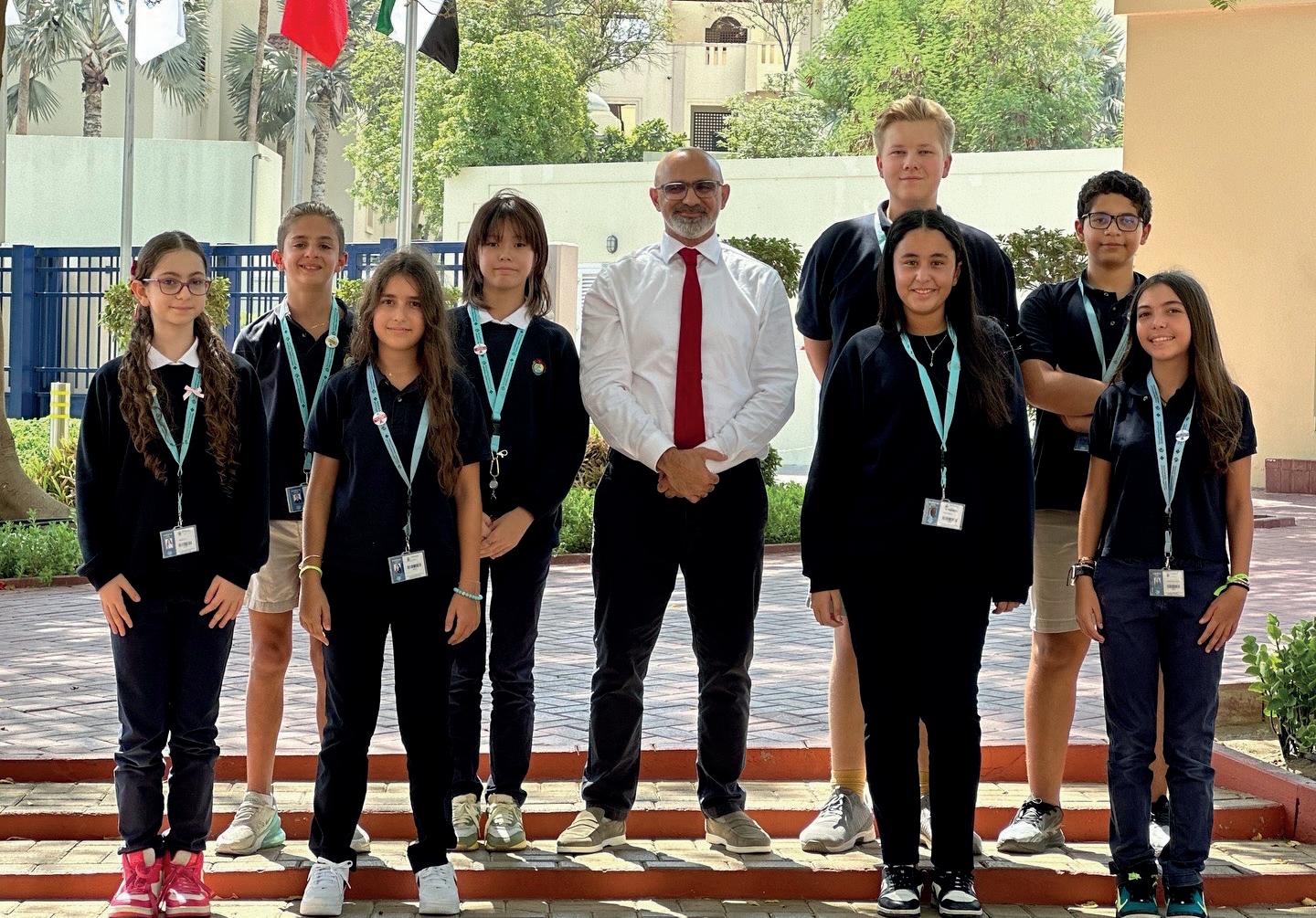

At UAS Middle School, we believe that students who demonstrate positive values and attributes contribute to a vibrant and supportive school environment. Our Scorpion Points system is designed to encourage and reward students who embody the core values of the UAS Learner Profile.
The development of a student’s character is an important part of educating children. For this reason, we aim to recognize students who are living the UAS values (curiosity, resilience, empathy, and belonging) and exhibiting the traits of the UAS Learner Profile (risktaker, open-minded, caring, thinker, inquirer, knowledgeable, communicator, balanced, principled, and reflective). Students will be nominated for these awards by their teachers and/or peers.
Students are eligible for an attendance award if they have perfect attendance. Each quarter, students have the opportunity to earn an attendance award by consistently being on time and not missing any days of school. Students who receive an attendance award for all for quarters will also receive the Perfect Attendance Award. These awards will be earned based on student attendance data.



Our dynamic, broad, balanced, and inclusive curriculum is based on the New York State Standards and modified to provide links to UAE culture and heritage as well as the culture and heritage of our students’ home countries. During Middle School, students are exposed to a wide variety of subjects with the goal of supporting them in identifying their strengths, areas of interest, and aspirations while preparing them for any high school pathway they may choose. Teachers recognize students’ varied needs, interests, and goals, using this information to ensure the curriculum is engaging and challenging for all learners. Our
curriculum provides opportunities for learning through creative, physical, and practical experiences that develop students’ knowledge, skills, and understandings. Throughout the program students engage in cross-curricular and conceptual learning in meaningful and engaging contexts. A strong focus is placed on students becoming fully independent learners through the development of thinking, communication, social, research, and self-management skills. There are also opportunities for students to learn beyond the classroom through special events, trips, visitors, and extracurricular activities.
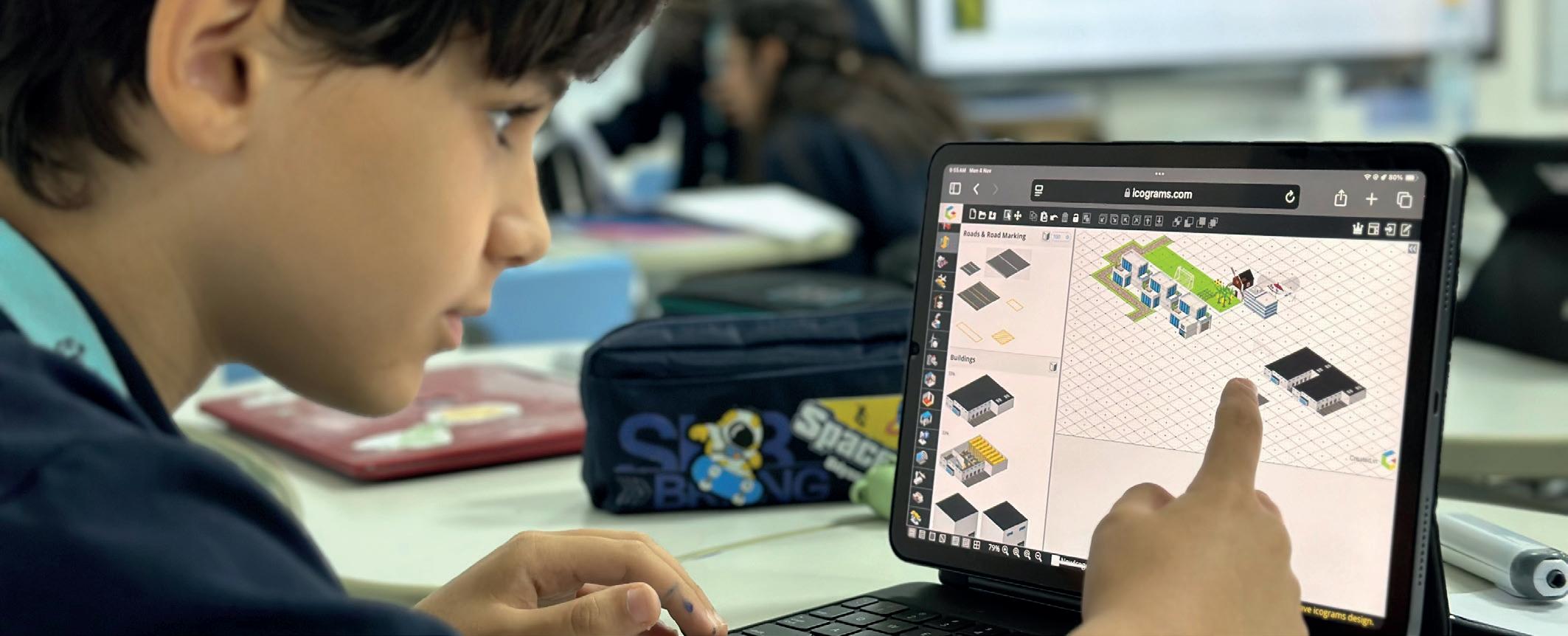
Universal American School is an American Curriculum school aligned to the New York State Standards from PreK to Grade 12 and the UAE Ministry of Education standards for Arabic, Islamic and Moral, Social, and Cultural Studies. The following standards support the development of knowledge, skills and understanding to prepare UAS middle school students for a rigorous high school program.
English Language Arts
NYS Next Generation English Language Arts Learning Standards
Mathematics
NYS Next Generation Mathematics Learning Standards
Science
NYS P-12 Science Learning Standards
Social Studies
C3 Framework for Social Studies State Standards
Arabic A
UAE Ministry of Education Arabic A Framework (in Arabic)
Arabic B
UAE Ministry of Education Arabic B (in English)
French & Spanish
NYS Learning Standards for World Languages
Islamic Studies
UAE Ministry of Education Islamic Framework (in Arabic) (in English)
Moral, Social, and Cultural Studies
UAE Ministry of Education Moral, Social, and Cultural Studies
Visual Art
NYS Learning Standards for the Arts - Visual Arts
Drama
NYS Learning Standards for the Arts - Theater
Music
NYS Learning Standards for the Arts - Music
Design
NYS Computer Science and Digital Fluency and ISTE Standards
Physical Education
NYS Physical Education Learning Standards
For each class, students receive grades for their academic performance based on the subject area standards as well as effort and behavior. Throughout each class students will participate in class activities, assignments, and assessments that will impact their progress report and report card grades. Students should make sure they do their best on every task in order to maximize their learning and ensure their personal best grades
Students are assessed using a range of instructional tools and strategies to best meet the needs of all learners. Students receive specific, timely, and constructive feedback on assessments that supports student progress in their learning. Teachers will record student progress regularly on PowerSchool, where parents will be able to monitor how their child is doing in their classes.
A
B
C
D
F
Five levels are used to communicate a student’s attainment at any given point in time. For progress reports and report cards, scores are reported in an A-F format. Please see the table below for the descriptor of each level.
• Produces consistently high-quality work.
• Communicates a comprehensive understanding of concepts and contexts.
• Consistently demonstrates sophisticated critical and creative thinking, such as synthesis, analysis, evaluation, and innovation.
• Frequently transfers knowledge and skills with independence and expertise in a variety of situations.
• Produces generally high-quality work.
• Communicates a secure understanding of concepts and contexts.
• Demonstrates critical and creative thinking, sometimes with sophistication.
• Uses knowledge and skills in familiar and unfamiliar classroom and realworld situations, often with independence.
• Produces good quality work.
• Communicates basic understanding of most concepts and contexts with few misunderstandings and minor gaps.
• Often demonstrates basic critical and creative thinking.
• Uses knowledge and skills in familiar classroom and real-world situations and, with support, some unfamiliar real-world situations.
• Produces work of an acceptable quality.
• Communicates basic understanding of many concepts and contexts, with occasionally significant misunderstandings or gaps.
• Begins to demonstrate some basic critical and creative thinking.
• Uses knowledge and skills with some flexibility in familiar classroom situations but requires support in real-world or unfamiliar situations.
• Produces work of limited quality.
• Expresses misunderstandings or significant gaps in understanding for many concepts and contexts.
• Infrequently demonstrates critical or creative thinking.
• Generally inflexible in the use of knowledge and skills, infrequently applying knowledge and skills.
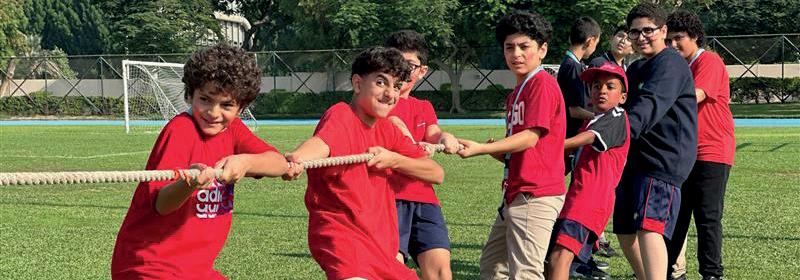
At UAS, we are dedicated to fostering an inclusive environment where all stakeholders are supported, challenged and encouraged to excel.
Our Approach:
Individualized Education Plans (IEPs): We create our student support plans in collaboration with parents, teachers, students, and specialists. These plans set personalized learning goals and outline support strategies to help students grow both academically and socially.
In-class support: We provide support through our Learning Support Teachers and Learning Support Assistants. The Inclusion Department works closely with teachers to ensure students needs are met and can succeed alongside their peers.
Co-teaching model: We use a co-teaching model where General Education and Learning Support Teachers work together to deliver lessons that meet the needs of all students. This allows us to support students with diverse learning profiles, using differentiated instruction to ensure each student learns at the appropriate level.
Screeners: We regularly check progress of our students to identify students’ specific challenges and develop effective support strategies. This proactive approach helps us tailor lesson plans and deliver instruction that meets each student’s unique needs.
At UAS, we recognize that English Language and Multilingual Learners (MLs) spend most of their day in content classrooms, facing the challenge of acquiring both academic content and English simultaneously.
Our Approach:
• Collaborative Model: Our EAL team partners with content teachers to integrate language support into subject lessons, helping students build both language and content knowledge.
• Personalized Support: In addition to classroom integration, students receive personalized support tailored to their specific language needs, ensuring they progress at an accelerated rate.
• Newcomer Program: Targeted at new arrivals, focusing on foundational English skills and introductory content knowledge, without missing core subject instruction. The Achieve 3000 reading program is a key tool we use to boost literacy skills.
• Integrated English Language and Literacy Program: Co-planning and co-teaching with content teachers, embedding academic language and literacy skills directly into subject areas.
• EAL Club: Provides extra-curricular opportunities for students to practice their language skills in a supportive, interactive environment.
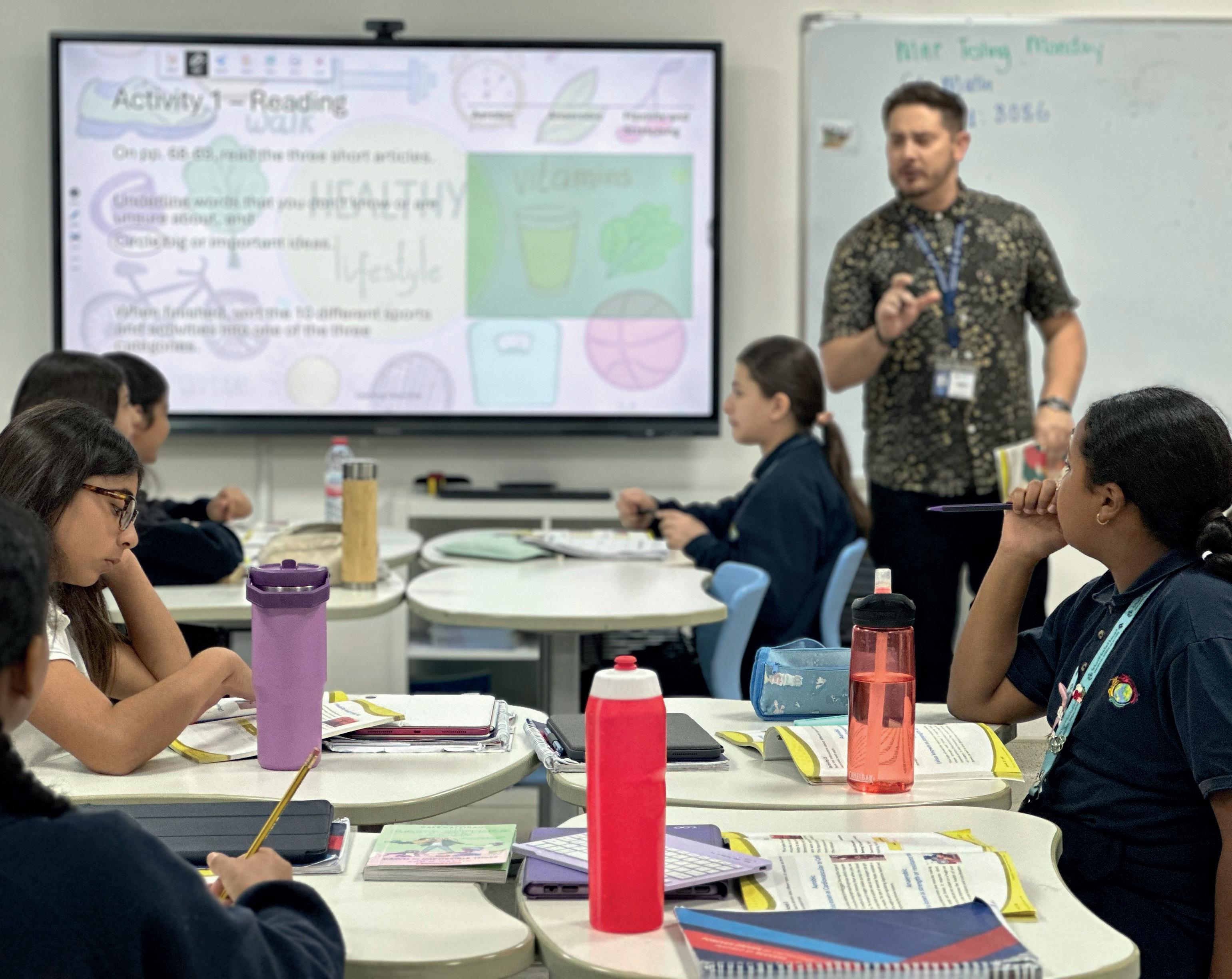
ENGLISH 6
English 6 is a year-long course that focuses on developing critical reading and writing skills. This course is designed to give students strategies to increase their reading comprehension across genres through active reading strategies, critical thinking skills, and oral and written responses to text. Students will develop their writing skills using the writing process to publish narratives, descriptions, and explanations. The ultimate goals of English 6 are to promote continued proficiency in the communication skills of students and encourage lifelong readers and writers.
Math 6 is a year-long course with attention on developing students’ mathematical thinking and problem-solving skills. In Grade 6, mathematics instruction will focus on four critical areas: (1) connecting ratio and rate to whole number multiplication and division and using concepts of ratio and rate to solve problems; (2) completing understanding of division of fractions and extending the notion of number to the system of rational numbers, which includes negative numbers; (3) writing, interpreting, and using expressions and equations; and (4) developing understanding of statistical thinking.
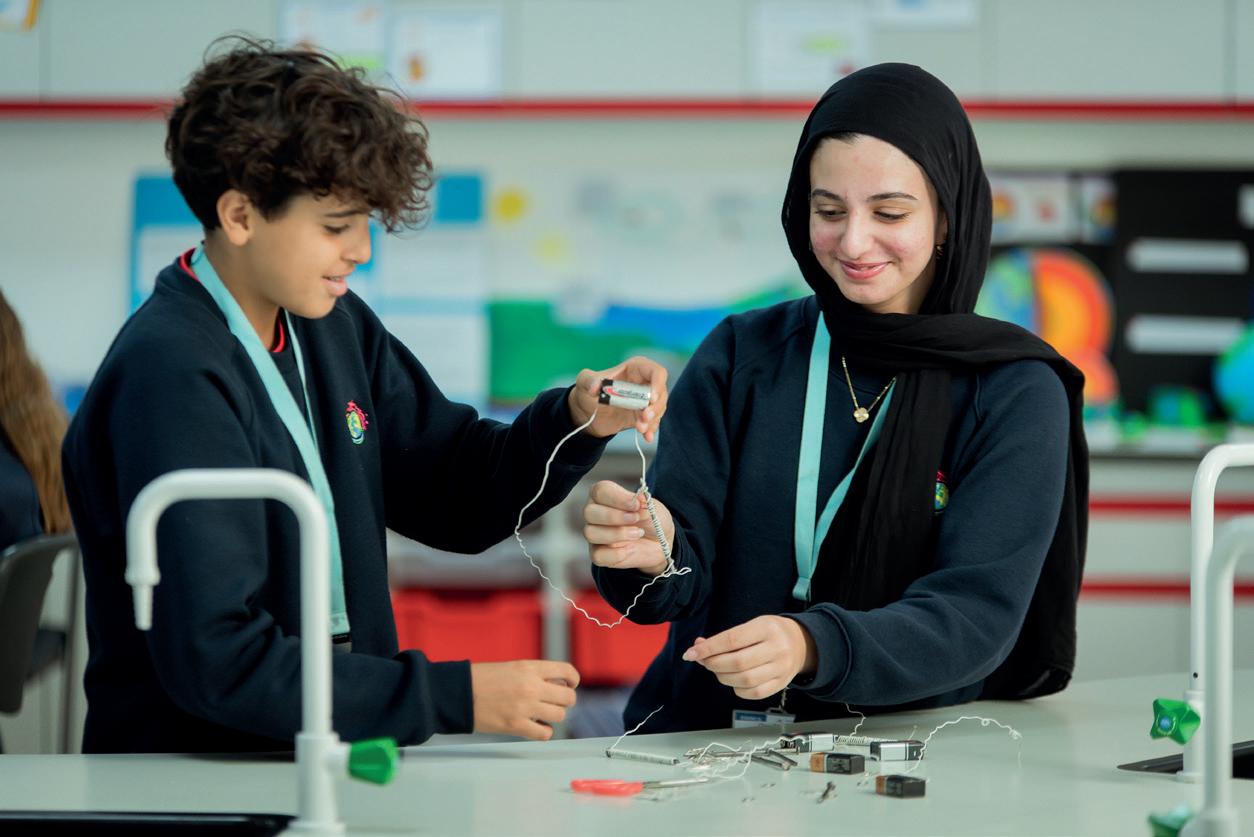
Science 6 is a year-long course and explores a range of topics in physical, life, and earth sciences. Students develop their ability to plan and conduct scientific investigations and apply their knowledge to real world situations. Units will include the reproduction of organisms, life structures and functions, energy in the atmosphere, and human impact on the environment. Learning in this course fosters a curiosity and love of science while building their skills for further scientific inquiry.
Social Studies 6 is a year-long course designed for
students to learn and apply Social Studies concepts and tools. During this course students are introduced to conducting inquiries involving Social Studies areas such as civics, economics, geography, and history. Through this process students will practice research and develop their analytical writing skills.
Arabic A 6 is a year-long course that builds on students’ reading, writing, speaking, and listening skills taught in earlier grades. Students will develop narratives, descriptions, and explanations through the writing process. The literary-based units will help them in exploring a wide variety of Arabic fiction and non-fiction texts. The course targets to build understanding of specific text features, allowing students to have deep discussions in classrooms, use the critical thinking skill to deepen their understanding and write a literary response for many types of texts. The students are expected to follow the ministry of education Standards that develop their skills in Arabic grammar and spelling while studying texts. The course provides an opportunity for students to apply their understanding in a new context by using text features in writing and speaking for different purposes.
This year-long course introduces and develops the fundamentals of Arabic by stressing the four skills of reading, listening, writing, and speaking. Through the use of authentic materials and topics that reflect their interests, students learn to communicate as well as to manipulate important structures of the language including vocabulary and grammar. Relevant aspects of Arab culture continue to be introduced to further enhance the students’ awareness of the Arabic speaking world. The foundation of the Arabic program is directed toward developing proficiency and confidence as well as an appreciation of the language and its culture. Students will be placed in a beginner, intermediate or advanced class in order to best meet their learning needs.
The Islamic Education Curriculum aims to prepare students with a solid belief in their religion and a pure soul that reflects the high values of Islam. Students will learn religious topics in an integrated cohort that merges with intellectual issues and general introductions to the theoretical sciences to expand the circle of student perceptions and correct the vision of religion and life by relying on basic themes. These themes consist of Quran like Surat-us-Sajdah and Al-Mulk, Hadith like the good and bad company, belief like the signs of the Day of Judgment, values like tolerance and being grateful to Allah, Rulings of Islam like prayer and fasting, biography like the life in Madinah after immigration. This is a year-long course.
MSC Studies 6 is a year-long course based on the UAE Ministry of Education’s Moral, Social, and Cultural Studies Program. Students will explore topics such as character and morality, individual and community, history, geography, sociology, economics, information literacy, information processing, heritage, and civics. The goal of this course is for students to understand and apply knowledge and skills from the various content areas.
This year-long course introduces and develops the
fundamentals of French in the four skills of reading, listening, writing, and speaking. Through the use of authentic materials and topics that reflect their interests, students learn to communicate as well as to manipulate important structures of the language including vocabulary, grammar, and idioms. Relevant aspects of French culture continue to be introduced to further enhance the students’ awareness of the French speaking world. The foundation of the French program is directed toward developing proficiency and confidence as well as an appreciation of the language and its culture.
This year-long course introduces and develops the fundamentals of Spanish in the four skills of reading, listening, writing, and speaking. Through the use of authentic materials and topics that reflect their interests, students learn to communicate as well as to manipulate important structures of the language including vocabulary, grammar, and idioms. Relevant aspects of Spanish culture continue to be introduced to further enhance the students’ awareness of the Spanish speaking world. The foundation of the Spanish program is directed toward developing proficiency and confidence as well as an appreciation of the language and its culture.
Physical & Health Education 6 is a year-long course building a strong foundation of the knowledge, skills, and attitude that lead a lifetime of health and fitness. Students will participate in individual and team pursuits while developing their physical fitness and skills. Students will also participate in health classes, learning how to care for their physical, emotional, and mental health.
Electives Rotation 6 is an exploratory course where students are introduced to fundamental concepts and skills in visual art, drama, music, and technology. This course serves to expose students to a variety of elective options to discover their interests and passions. Students will participate in each component of the program for one quarter.
English 7 is a year-long course designed to build on students’ learning in English 6. Students read and study a variety of fiction and nonfiction genres, developing a deeper understanding of reading as a process that includes analyzing and comprehending texts. Through varied and frequent writing assignments, students build on their understanding of writing as a process that includes drafting, revising, editing, and publishing. Language study includes building vocabulary, learning about grammar, and spelling in order to enhance student writing.
Math 7 is a year-long course with attention on developing students’ mathematical thinking and problem-solving skills. In Grade 7, mathematics instruction will focus on four critical areas: (1) developing understanding of and applying proportional relationships; (2) developing understanding of operations with rational numbers and working with expressions and linear equations; (3) solving problems involving scale drawings and informal geometric constructions, and working with two- and
three-dimensional shapes to solve problems involving area, surface area, and volume; and (4) drawing inferences about populations based on samples.
SCIENCE 7
Science 7 is a year-long course nd explores a range of topics in physical, life, and earth sciences. Students develop their ability to ask testable questions, develop models, design, and conduct investigations, collect and analyze data, construct explanations and scientific arguments, and obtain and communicate information. Students are expected to apply their knowledge and skills to real-world phenomena and engineering challenges.
Social Studies 7 is a year-long course that builds on Social Studies 6. Students conduct more involved inquiries involving social studies areas such as civics, economics, geography, and history. As students engage in more indepth studies, they continue to develop their research and analytical writing skills.
ARABIC A 7
Arabic A 7 is a year-long course designed to build on students’ learning in Arabic A 6. Students read and study a variety of fiction and nonfiction. The literary-based units help students to deeply understand the text features and the effect on targeted audiences. Language study includes building vocabulary, learning about grammar, and spelling. Students are expected to organize their writing for different purposes, using descriptive and narrative. Students also learn to use Standard Arabic in class debate and oral presentations and to express their opinion with confidence. The students are expected to follow the UAE Ministry of Education Standards that develop their skills in Arabic grammar and spelling while studying texts.
ARABIC B 7
This year-long course introduces and develops the fundamentals of Arabic by stressing the four skills of reading, listening, writing, and speaking. Through the use of authentic materials and topics that reflect their interests, students learn to communicate as well as to manipulate important structures of the language including vocabulary and grammar. Relevant aspects of Arab culture continue to be introduced to further enhance the students’ awareness of the Arabic speaking world. The foundation of the Arabic program is directed toward developing proficiency and confidence as well as an appreciation of the language and its culture. Students will be placed in a beginner, intermediate or advanced class in order to best meet their learning needs.
The Islamic Education Curriculum aims to prepare students with a solid belief in their religion and a pure soul that reflects the high values of Islam. Students will learn religious topics in an integrated cohort that merges with intellectual issues and general introductions to the theoretical sciences to expand the circle of student perceptions and correct the vision of religion and life by relying on basic themes. These themes consist of Quran like Surat Qaf, Hadith like the reward of praying at mosque, belief like the oneness of Allah, values like moderate spending, Rulings of Islam like dry ablution, biography like the Battle of the Trench. This is a year-long course.
MSC Studies 7 is a year-long course based on the UAE Ministry of Education’s Moral, Social, and Cultural Studies Program. Students will explore topics such as character and morality, individual and community, history, geography, sociology, economics, information literacy, information processing, heritage, and civics. The goal of this course is for students to understand and apply knowledge and skills from the various content areas.
This year-long course introduces and develops the fundamentals of French in the four skills of reading, listening, writing, and speaking. Through the use of authentic materials and topics that reflect their interests, students learn to communicate as well as to manipulate important structures of the language including vocabulary, grammar, and idioms. Relevant aspects of French culture continue to be introduced to further enhance the students’ awareness of the French speaking world. The foundation of the French program is directed toward developing proficiency and confidence as well as an appreciation of the language and its culture.
7
This year-long course introduces and develops the fundamentals of Spanish in the four skills of reading, listening, writing, and speaking. Through the use of authentic materials and topics that reflect their interests, students learn to communicate as well as to manipulate important structures of the language including vocabulary, grammar, and idioms. Relevant aspects of Spanish culture continue to be introduced to further enhance the students’ awareness of the Spanish speaking world. The foundation of the Spanish program is directed toward developing proficiency and confidence as well as an appreciation of the language and its culture.
PHYSICAL AND HEALTH EDUCATION 7
Physical & Health Education 7 is a year-long course building on the foundation of Physical & Health Education 6. Students expand their participation in individual and team pursuits while further developing their physical fitness and skills. Students will also participate in health classes, adding strategies they can use regularly to support their physical, emotional, and mental health.
GRADE 7 ELECTIVES
(Students will select 2 semester-long courses from the following list.)
7
Technology 7 is a semester-long course where students explore the use of technology in the modern world. In this course students will gain an understanding of the many uses of digital technology with a focus on computer science, coding, and digital fluency.
7
Visual Art 7 is a semester-long course where students are provided opportunities to sample art techniques and skills in a variety of 2- and 3-dimensional media, to develop their understanding of the artistic process and build on skills learned in the art program. Students will also increase their capacity for visual literacy by examining the relationship of art and cultures, and responding to a variety of works of art.
Music 7 is a semester-long course where students explore and investigate percussion and string instruments to develop an in-depth understanding of how to read guitar tablature and rudiments of drumming. Students will use gained knowledge to perform basic drum beats and guitar solo and group pieces.
Grade 7 is a semester-long elective centered on acting and creativity through Greek myths. Students first adapt existing Greek myths, developing vocal and physical expression. Next, they create original mythological creatures, drawing inspiration from their own cultures and personalities. In smaller groups, they collaborate to write and perform their own myth-based plays.
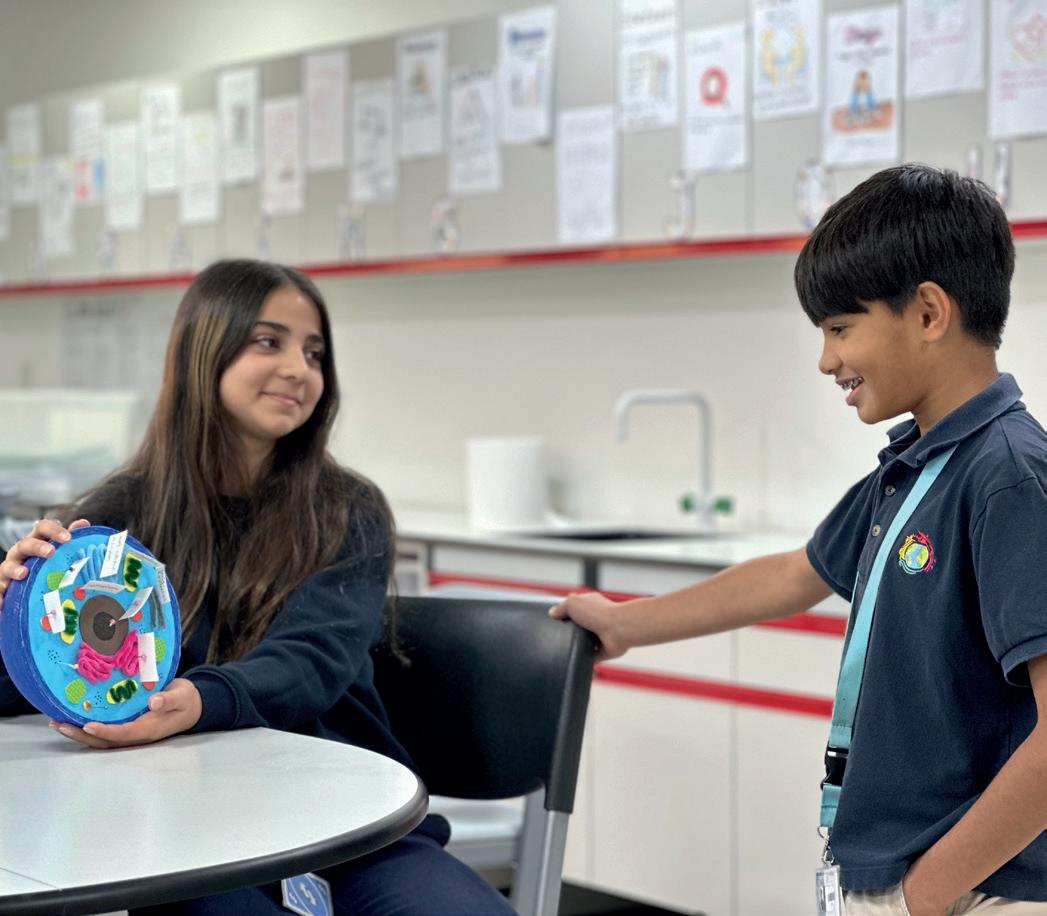
English 8 is a year-long course designed for students to continue honing their communication skills in reading, writing, listening, and speaking while building a strong literacy base for high school. Students will read, analyze, and write increasingly complex texts in various genres. Language study includes building vocabulary, learning about grammar, and spelling in order to enhance student writing. Students will further develop their research skills, and adapt their speaking and writing to various audiences, topics, purposes, and situations.
Math 8 is a year-long course with attention on developing students’ mathematical thinking and problem-solving skills. In Grade 8, mathematics instruction will focus on three critical areas: (1) formulating and reasoning about expressions and equations, including modeling an association in bivariate data with a linear equation, and solving linear equations and systems of linear equations; (2) grasping the concept of a function and using functions to describe quantitative relationships; (3) analyzing twoand three-dimensional space and figures using distance, angle, similarity, and congruence, and understanding and applying the Pythagorean Theorem.
Selected students are invited to participate based on prior
Math report card grades, MAP math data, and teacher recommendation.
Algebra I is a year-long course that builds on algebraic reasoning developed in grades k-7 with a more focused study of algebraic patterns and representations. This course develops students’ ability to think algebraically and reason symbolically. The primary focal points in Algebra I include the study of linear, quadratic, and exponential functions and their related transformations, equations, and associated solutions. Students will use a variety of representations (concrete, pictorial, numerical, symbolic, graphical, and verbal), tools, and technology to model mathematical situations to solve meaningful problems.
Science 8 is a year-long course and explores a range of topics in physical, life, and earth and space sciences. Students refine their ability to ask testable questions, develop models, design, and conduct investigations, collect and analyze data, construct explanations and scientific arguments, and obtain and communicate information. Units will include change over time, energy in motion, understanding waves, and humans and their place in the universe. Units will include understanding matter, the changing earth, earth’s resources, and interactions within ecosystems. This course equips students to formulate investigations of real-world phenomena and design solutions for real-world engineering challenges.
Social Studies 8 is a year-long course designed that builds on Social Studies 7. Students will conduct increasingly independent inquiries involving social studies areas such as civics, economics, geography, and history. Students continue to develop their research, thinking, and analytical writing skills in order to prepare for high school Humanities classes.
ARABIC A 8
Arabic A 8 is a year-long course designed to build on students’ learning in Arabic A 7. Students read and study a variety of fiction and nonfiction. The literary-based units help students to deeply understand the text features and the effect on targeted audiences.
Language study includes building vocabulary, learning about grammar, and spelling. Students are expected to organize their writing for different purposes, using descriptive and narrative. Students also learn to use Standard Arabic in class debate and oral presentations and to express their opinion with confidence. The students are expected to follow the Ministry of Education Standards that develop their skills in Arabic grammar and spelling while studying texts. The course exposes students to understand, analyze and evaluate writing techniques used by authors to form the meaning.
This year-long course introduces and develops the fundamentals of Arabic by stressing the four skills of reading, listening, writing, and speaking. Through the use of authentic materials and topics that reflect their interests, students learn to communicate as well as to manipulate important structures of the language including vocabulary and grammar. Relevant aspects of Arab culture continue to be introduced to further enhance the students’ awareness of the Arabic speaking world. The foundation of the Arabic program is directed toward developing proficiency and confidence as well as an appreciation of
the language and its culture. Students will be placed in a beginner, intermediate or advanced class in order to best meet their learning needs.
The Islamic Education Curriculum aims to prepare students with a solid belief in their religion and a pure soul that reflects the high values of Islam. Students will learn religious topics in an integrated cohort that merges with intellectual issues and general introductions to the theoretical sciences to expand the circle of student perceptions and correct the vision of religion and life by relying on basic themes. These themes consist of Quran like Surat Yasin, Hadith like the intention of actions, belief like the belief in decree and destination, values like sincerity, Rulings of Islam like voluntary prayers, biography like the conquest of Makkah. This is a year-long course.
MSC Studies 8 is a year-long course based on the UAE Ministry of Education’s Moral, Social, and Cultural Studies Program. Students will explore topics such as character and morality, individual and community, history, geography, sociology, economics, information literacy, information processing, heritage, and civics. The goal of this course is for students to understand and apply knowledge and skills from the various content areas.
This year-long course introduces and develops the fundamentals of French in the four skills of reading, listening, writing, and speaking. Through the use of authentic materials and topics that reflect their interests, students learn to communicate as well as to manipulate important structures of the language including vocabulary, grammar, and idioms. Relevant aspects of French culture continue to be introduced to further enhance the students’ awareness of the French speaking world. The foundation of the French program is directed toward developing proficiency and confidence as well as an appreciation of the language and its culture.
to become more independent in caring for their own physical, emotional, and mental health.
Students will select 2 semester-long courses from the following list.
Technology 8 is a semester-long course where students explore the use of technology in the modern world. In this course students will gain an understanding of the many uses of digital technology with a focus on computer science, coding, and digital fluency.
Visual Art 8 is a semester-long course where students have the opportunity to apply skills and knowledge developed during previous art courses in a variety of in-depth art making experiences. Students will utilize 2-dimensional media to solve artistic problems individually and be able to reflect on their individual artistic process and the purpose behind their solutions. Students will actively engage in class discussions critiquing historical artworks as well as personal and peer work.

This year-long course introduces and develops the fundamentals of Spanish in the four skills of reading, listening, writing, and speaking. Through the use of authentic materials and topics that reflect their interests, students learn to communicate as well as to manipulate important structures of the language including vocabulary, grammar, and idioms. Relevant aspects of Spanish culture continue to be introduced to further enhance the students’ awareness of the Spanish speaking world. The foundation of the Spanish program is directed toward developing proficiency and confidence as well as an appreciation of the language and its culture.
Physical & Health Education 8 is a year-long course, building on the knowledge and skills learned in Physical & Health Education 7. Students further expand their participation in individual and team pursuits while developing their physical fitness and skills. Students will continue to participate in health classes and are expected
Music 8 is a semester-long course where students will explore music composition and performances. Students will investigate various cultures and their stylistic features, music theories of scales and chord whilst utilizing music technology to compose music which creates a connection to service-learning and music for films.
Drama - Grade 8 is a semester-long course focused on acting through duologues and group play production. Students begin by working on duologues, developing vocal and physical expression, scene analysis, and blocking, while building connections with their scene partners. In the second half, they collaborate on a play, moving through production stages from script selection to performance. The course emphasizes character development, group dynamics, and balancing faithfulness to the script with artistic freedom.
*Please